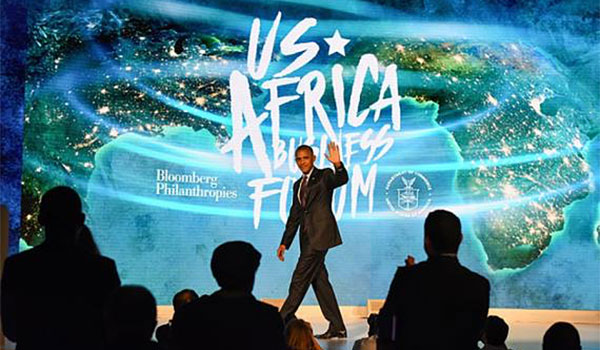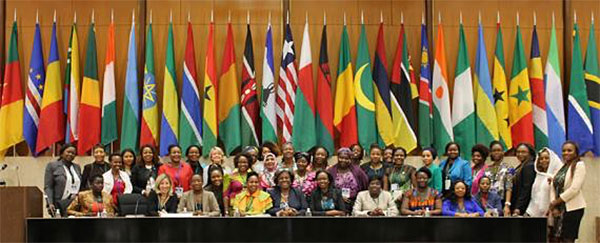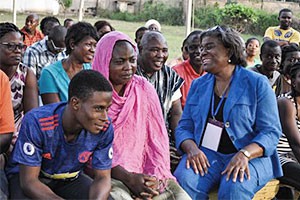2016 a big year for the US-Africa partnership
It has been an encouraging year for our partnership with Africa. Alongside our African partners, we have made significant progress advancing democracy, peace, and prosperity throughout the continent, though challenges, of course, remain. Let me share some of the highlights:
YALI: The President’s Young African Leaders Initiative (YALI) continued to have tremendous success. This year, we expanded YALI’s flagship program, the Mandela Washington Fellowship, from 500 to 1,000 participants. These YALI Fellows are ambitious and talented, and they are definitely the future leaders of their countries in the private sector, the public sphere, and civil society. This program is central to creating opportunity for Africa’s next generation.
ELECTIONS: African countries held several successful presidential elections this year. Earlier this month, Ghana reaffirmed its status as a democratic model for the continent. I traveled to Ghana to observe the presidential election, and it was one of the most transparent elections I’ve witnessed. Our support for the electoral process helped ensure the success of the election.
U.S.-AFRICA BUSINESS FORUM: The 2016 U.S.-Africa Business Forum brought together more than 200 African and U.S. CEOs with African heads of state, U.S. cabinet members, and members of Congress to generate new commercial partnerships. This year’s forum mobilized $9.1 billion in trade and investment with Africa, and those commitments will be crucial for creating the jobs that the continent’s rapidly-expanding youth population needs.

POWER AFRICA: Two out of three people in sub-Saharan Africa lack access to electricity. The Power Africa initiative is helping to change this by aiming to provide 30,000 MW of new generator capacity by 2030. Thus far, Power Africa has brought 4,600 MW of projects to financial close, and has projects in the pipeline that come very close to meeting the goals of the initiative. I was pleased to attend the ribbon-cutting ceremony for Liberia’s Mt. Coffee hydroelectric power plant rehabilitation supported by MCC. More electricity means better education, more jobs, and more opportunity.
AGOA: The State Department hosted the 2016 U.S.-sub-Saharan Africa Trade and Economic Cooperation Forum — known as the African Growth and Opportunity Act (AGOA) Forum — in September. This forum brought together government officials and delegations from more than 30 countries with private sector and civil society leaders to discuss practical ways to expand U.S. trade and investment with Africa. We had a big AGOA success story in South Africa this year: close interagency cooperation and exceptional diplomatic efforts by Embassy Pretoria convinced the government of South Africa to lift restrictions that had previously blocked U.S. exports of poultry, pork, and beef, restoring U.S. market access and preserving South African AGOA benefits.
WOMEN: Through the State Department’s WECREATE initiative, we have established entrepreneurial community centers in African countries that are empowering women to start and grow businesses. These centers are having a huge impact. For example, the WECREATE Center in Zambia has provided training to more than 8,600 Zambian women entrepreneurs who have started 224 new businesses and created over 3,000 new jobs. Africa’s success depends on women participating in all aspects of society, and these centers will help integrate women into their countries’ economies.

SECURITY: We assisted African partners contributing to UN and AU peacekeeping operations and to the African Standby Force. Of note, in 2016 the Africa Contingency Operations Training and Assistance (ACOTA) program trained over 26,000 troops and helped deploy over 38 peacekeeping units to nine operations, raising the standards of performance in difficult operating environments and seeking to end sexual exploitation and abuse and other misconduct. African countries are currently providing 61 percent of the peacekeepers in all global UN and AU missions. Certainly, the recent Washington Post article noting failures in vetting of peacekeepers reminds us all of the need to insist on full accountability but does not take away from the fact that the vast majority of African peacekeepers are doing a valuable service around the world but in particular in Africa itself.
The Security Governance Initiative (SGI), launched at the 2014 U.S.-Africa Leaders Summit, seeks in a small, cost-effective manner to assist a half dozen African countries to improve their militaries in such areas as drafting a national security framework or establishing a holistic border management strategy. Finally, with U.S. support, security forces from Nigeria, Niger, Chad, Cameroon, and Benin have shown unprecedented joint resolve in seeking to defeat Boko Haram by sharing intelligence and conducting coordinated security operations. Together, they have significantly weakened these deadly terrorists.
We know that much work remains. The continent faces many challenges, yet has many opportunities as well. We will continue to work to strengthen our partnership to advance democracy, peace, and prosperity for all Africans and in doing so share American values and contribute to our national security and prosperity.


